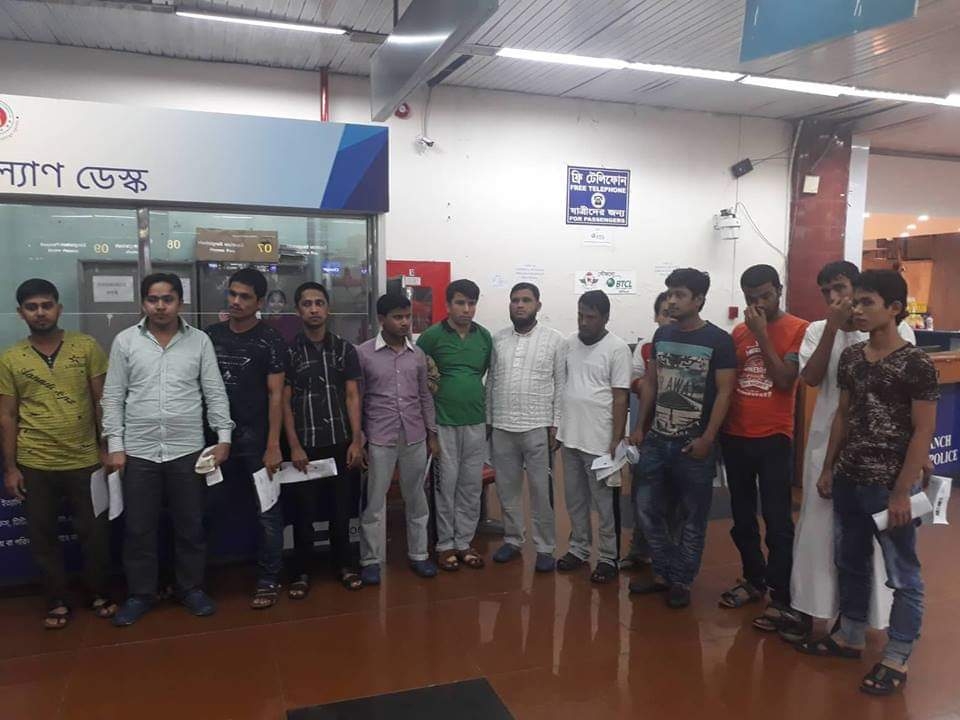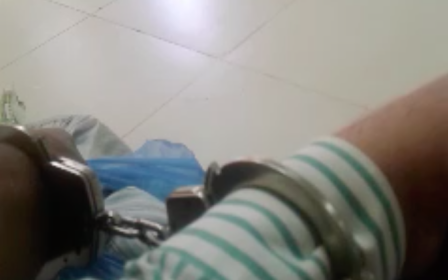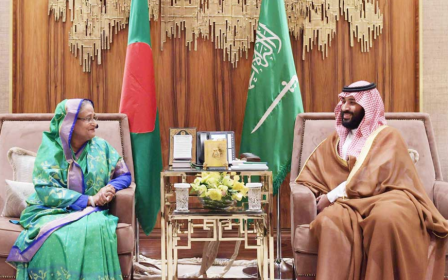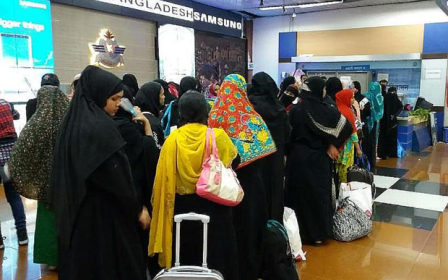After years in Saudi detention, deported Rohingya face jail in Bangladesh

More than a dozen stateless Rohingya refugees, deported by Saudi Arabia to Bangladesh, are expected to be imprisoned for entering the kingdom on Bangladeshi passports that were obtained via fake documents.
The stateless Rohingya had been forcibly removed from Saudi Arabia on Monday night, after being locked up in a Saudi detention centre for several years.
The undocumented Rohingya, upon arrival at the main airport in Bangladesh, were then questioned by immigration police, where they confessed to buying Bangladeshi passports from smugglers.
Mohammed Nour Azem Miah, the officer-in-charge at Dhaka's Shahjalal International Airport police station, confirmed that the 13 Rohingya had been detained and faced charges of forging Bangladeshi passports under the country's passport act.
Instead of keeping them in prison, they should be sent to the [Rohingya] refugee camps where they can be reunited with their families
- Nay San Lwin, Rohingya activist
"The men confessed to being Rohingya following questioning by the immigration police," Miah told Middle East Eye.
"The courts are now processing their case where they are being charged with going to Saudi Arabia on fake passports and forging documents to get them."
Miah noted that 53 people were on board the Saudi deportation flight to Bangladesh but could not confirm if they were all Rohingya.
If sentenced, the stateless Rohingya could face prison time in Bangladesh.
When asked why the Bangladeshi authorities could not send the Rohingya to refugee camps in southern Bangladesh, Miah declined to comment and said that the police were following procedure.
Nay San Lwin, a Rohingya activist, has called on Bangladeshi authorities to send the stateless Rohingya to the refugee camps.
"Bangladesh shouldn't detain them, as these Rohingya have been detained for more than five years [by Saudi Arabia] for holding different passports," Lwin told MEE. "Instead of keeping them in prison, they should be sent to the refugee camps where they can be reunited with their families.
"Any consideration should be done on humanitarian grounds. Bangladesh has received global recognition for sympathising with more than a million refugees. We are grateful to Bangladesh for giving us refuge and on behalf of all Rohingya, request you release these 13 Rohingya as soon as possible."
Local reports and images sent to MEE also confirmed that the detained Rohingya were deported to Bangladesh on emergency travel documents, not passports, issued by Bangladesh's embassy in Saudi Arabia.
Videos, images and voice notes sent to MEE on Sunday showed scores of Rohingya inside the Shumaisi detention centre in Saudi Arabia handcuffed and prepared for deportation to Bangladesh, despite coming from Myanmar.
Rohingya in Saudi
In November, Middle East Eye reported that Rohingya detainees inside the Shumaisi detention centre were being prepared for deportation just days after Bangladeshi Prime Minister Sheikh Hasina visited Saudi Arabia and met Saudi Crown Prince Mohammed bin Salman.
Detainees told MEE they were "punched" in the chest by Saudi immigration police and forced to sign documents testifying to their "full mental health" on Saudi Interior Ministry forms before their deportation to Bangladesh.
Scores of Rohingya had resorted to using smugglers to obtain passports, often via forged documents, following Myanmar's ban on Rohingya obtaining Burmese passports.
Upon arrival to Saudi Arabia, Rohingya are registered with their fingerprint on the passport with which they come into the country.
Many Rohingya locked up in the Shumaisi detention centre came to Saudi Arabia on Bangladeshi passports, while others entered on passports from different South Asian countries, including Bhutan, India, Pakistan and Nepal.
New MEE newsletter: Jerusalem Dispatch
Sign up to get the latest insights and analysis on Israel-Palestine, alongside Turkey Unpacked and other MEE newsletters
Middle East Eye delivers independent and unrivalled coverage and analysis of the Middle East, North Africa and beyond. To learn more about republishing this content and the associated fees, please fill out this form. More about MEE can be found here.




